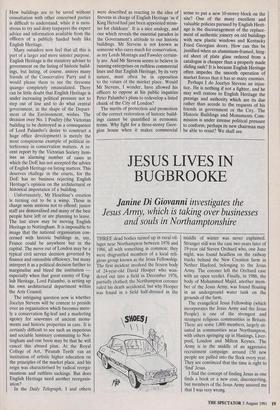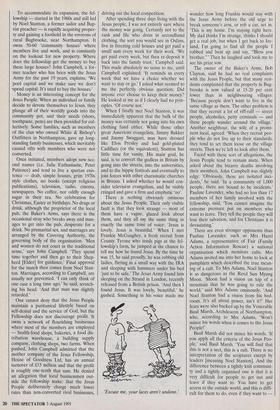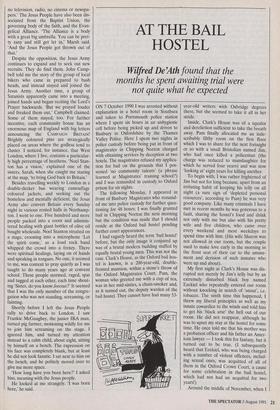JESUS LIVES IN BUGBROOKE
Janine Di Giovanni investigates the
Jesus Army, which is taking over businesses and souls in Northamptonshire
THREE dead bodies turned up in rural vil- lages near Northampton between 1976 and 1986, all with something in common: they were disgruntled members of a local reli- gious group known as the Jesus Fellowship. The first incident involved the frozen body of 24-year-old David Hooper who wan- dered out into a field in December 1976, partially clothed; the Northampton coroner ruled his death accidental, but why Hooper was found in a field half-dressed in the middle of winter was never explained. Stranger still was the case two years later of 19-year old Steven Orchard who, one June night, was found headless on the railway tracks behind the New Creation farm in Nether Hayford, belonging to the Jesus Army. The coroner left the Orchard case with an open verdict. Finally, in 1986, the body of Mohammed Majid, another mem- ber of the Jesus Army, was found floating in an underground water tank on the grounds of the farm.
The evangelical Jesus Fellowship (which incorporates the Jesus Army and the Jesus People) is one of the strongest and strangest religious communities in Britain. There are some 1,000 members, largely sit- uated in communities near Northampton, with others springing up in Hastings, Liver- pool, London and Milton Keynes. The Army is in the middle of an aggressive recruitment campaign: around 150 new people are pulled into the flock every year. They are convinced that the time is right to `find' Jesus.
I find the concept of finding Jesus as one finds a book or a new coat, disconcerting, but members of the Jesus Army assured me that I was very wrong. To accommodate its expansion, the fel- lowship — started in the 1960s and still led by Noel Stanton, a former sailor and Bap- tist preacher — is rapidly acquiring proper- ty and gaining a foothold in the environs of rural Bugbrooke, near Northampton. It owns 50-60 'community houses' where members live and work, and is constantly on the lookout for new property. Where does the fellowship get the money to buy these large houses? John Campbell, a for- mer teacher who has been with the Jesus Army for the past 19 years, explains, 'We pool capital and we make sure we don't -spend capital. It's used to buy the houses.'
Money is an interesting concept for the Jesus People. When an individual or family decide to devote themselves to Jesus, they plunge all of their worldly goods into the community pot, and their needs (shoes, toothpaste, pens) are then provided for col- lectively. Some families, such as members of the clan who owned White & Bishop's Outfitters in Northampton, gave up long- standing family businesses, which inevitably caused rifts with members who were not converted.
Once initiated, members adopt new sec- ond names (i.e. Julie Enthusiastic, Peter Patience) and tend to live a spartan exis- tence — drab, simple houses, grim 1970s style clothes, no books (except religious publications), television, radio, cinema, newspapers. No coffee, nor oddly enough sugar in their tea. No celebration for Christmas, Easter or birthdays. No drugs or drink, although the proprietor of the local pub, the Baker's Arms, says there is the occasional stray who breaks away and man- ages to get into the pub, desperate for a drink. No premarital sex, and marriages are arranged by the Covering Authority, the governing body of the organisation. 'Men and women do not court in the traditional sense,' says John Campbell. 'They spend time together and then go to their Shep- herd [Elder] for guidance.' Final approval for the match then comes from Noel Stan- ton. Marriages, according to Campbell, are usually not prevented. 'I can only think of one case a long time ago,' he said, scratch- ing his head. 'And that man was slightly retarded.'
One cannot deny that the Jesus People maintain a puritanical lifestyle based on self-denial and the service of God, but the Fellowship does not discourage profit. It owns a network of flourishing businesses where most of the members are employed — health-food shops, bakeries, a food dis- tribution warehouse, a building supply company, clothing shops, two farms. When pushed, John Campbell admitted that the mother company of the Jesus Fellowship, House of Goodness Ltd, has an annual turnover of £15 million and that the profit is roughly one-tenth that sum. He denied an allegation that local businessmen out- side the fellowship make: that the Jesus People deliberately charge much lower rates than non-converted rival businesses, driving out the local competition.
After spending three days living with the Jesus people, I was not entirely sure where the money was going. Certainly not to the rank and file who dress in secondhand clothing, the sort you would see in Oxfam, live in freezing cold houses and get paid a small sum every week for their work. 'We get paid every week, but then re-deposit it back into the family trust,' Campbell said. This made absolutely no sense to me, until Campbell explained: 'It reminds us every week that we have a choice whether we want to stay or go.' I asked what seemed to me the perfectly obvious question: Did anyone ever choose to keep their money? He looked at me as if I clearly had no prin- ciples. 'Of course not.'
When I finally met Noel Stanton, it was immediately apparent that the bulk of the money was certainly not going into his own clothing fund either. While those other great American evangelists, Jimmy Bakker and Jimmy Swaggart, may have dressed like Elvis Presley and had gold-plated Cadillacs (or the equivalent), Stanton has little time for vanity. His main goal, he said, is to convert the godless in Britain by going into the streets, into the universities, and to the hippie festivals and eventually to join forces with other charismatic churches in Britain. I asked whether he would con- sider television evangelism, and he visibly cringed and gave a firm and emphatic 'no'.
There is nothing obviously ominous about the Jesus People. Their only visible fault is that they look strange — most of them have a vague, glazed look about them, and they all say the same thing in exactly the same tone of voice: 'Jesus is lovely. Jesus is beautiful.' When I met Frankie McGuaghey, a fresh recruit from County Tyrone who tends pigs at the fel- lowship's farm, he jumped at the chance to tell me how he found Jesus. By the time he was 15, he said proudly, he was robbing old ladies, flirting in a small way with the IRA and sleeping with hammers under his bed `just to be safe.' The Jesus Army found him sleeping on the Strand in London, recently released from a British prison. 'And then found Jesus. It was lovely, beautiful,' he gushed. Something in his voice made me `Excuse me, your laces aren't undone.' wonder how long Frankie would stay with the Jesus Army before the old urge to break someone's arm, or rob a car, set in. `This is my home. I'm staying right here. My dad thinks I'm strange, thinks I should get a real job, but when I get back to Ire- land, I'm going to find all the people I robbed and beat up and say, "Bless you brother."' Then he laughed and took me to see his prize sow.
The owner of the Baker's Arms, Bob Clayton, said he had no real complaints with the Jesus People, but that many resi- dents complained that the property in Bug- brooke is now valued at 15-20 per cent lower than in neighbouring villages: `Because people don't want to live in the same village as them. The other problem is that they recruit a lot of riff-raff — street people, alcoholics, petty criminals — and these people wander around the village.' Another neighbour, the wife of a promi- nent local, agreed: 'When they recruit peo- ple who do not live up to their standards, they tend to set them loose on the village streets. Then we're left to look after them.'
Faced with these sort of allegations, the Jesus People tend to remain mute. When asked about the bizarre deaths involving their members, John Campbell was slightly edgy: 'Obviously, these are isolated inci- dents,' he said. 'In a community of 1,000 people, there are bound to be incidents.' Pauline Lavender, who had no less than 17 members of her family involved with the fellowship, said, 'You cannot imagine the extreme pressure put on members who want to leave. They tell the people they will lose their salvation, and for Christians it is devastating.'
There are even stronger opponents than Pauline Lavender, such as Mrs Hazel Adams, a representative of Fair (Family Action Information Rescue) a national organisation which monitors cults. Mrs Adams invited me into her home to look at pamphlets which described the true mean- ing of a cult. To Mrs Adams, Noel Stanton is as dangerous as the Revd Sun Myung Moon. 'Moon had a vision on top of a mountain that he was going to rule the world,' said Mrs Adams ominously. 'And Noel Stanton had a vision from his bed- room. It's all about power, isn't it?' Her fears were also backed up by the Venerable Basil Marsh, Archdeacon of Northampton, who, according to Mrs Adams, 'Won't mince his words when it comes to the Jesus People!'
Basil Marsh did not mince his words. 'If you apply all the criteria of the Jesus Peo- ple,' said Basil Marsh. 'You will find that this is not a sect, this is a cult. There is no interpretation of the scriptures except by leaders [meaning Noel Stanton]. And the difference between a tightly knit communi- ty and a tightly organised one is that it is very difficult for people to get out and leave if they want to. You have to get access to the outside world, and this is diffi- cult for them to do, even if they want to — no television, radio, no cinema or newspa- pers.' The Jesus People have also been dis- sociated from the Baptist Union, the governing body of the faith, and the Evan- gelical Alliance. 'The Alliance is a body with a great big umbrella. You can be pret- ty zany and still get let in,' Marsh said. `And the Jesus People got thrown out of that.'
Despite the opposition, the Jesus Army continues to expand and to seek out new recruits. They do find them. John Camp- bell told me the story of the group of local bikers who came in prepared to bash heads, and instead stayed and joined the Jesus Army. Another time, a group of Satanists apparently came into a meeting, joined hands and began reciting the Lord's Prayer backwards. 'But we prayed louder and freaked them out,' Campbell claimed. Some of them stayed, too. For further incentive, each community house has an enormous map of England with big letters announcing the CAMPAIGN BRITAIN! Brightly coloured pins are strategically placed on areas where the godless tend to cluster. I noticed, for instance, that West London, where I live, contains a particular- ly high percentage of heathens. 'Noel Stan- ton has a vision,' explained one of the sisters, Sarah, when she caught me staring at the map, 'to bring God back to Britain.'
Besides travelling weekly to London in a double-decker bus wearing camouflage coloured jackets, and seeking out the homeless and mentally deficient, the Jesus Army also convert Britain every Sunday night in various rented halls in Northamp- ton. I went to one. Five hundred and more people packed into a room and adminis- tered healing with giant bottles of olive oil bought wholesale. Noel Stanton strutted on a stage, crooning into a microphone 'Let the spirit come,' as a loud rock band whipped the crowd into a frenzy. There were spiritual healings, laying on of hands and speaking in tongues. No one, it seemed to me, was content to pray quietly as I was taught to do many years ago at convent school. These people stormed, raged, spat and tugged at each other, each time shout- ing 'Sister, do you know Jeeesus?' It seemed that I was the only member of the congre- gation who was not standing, screaming, or fainting.
Shortly before I left the Jesus People rally to drive back to London, I saw Frankie McGuaghey, the junior IRA man, turned pig farmer, motioning wildly for me to join him screaming on the stage. I ignored him, and turned my attention instead to a calm child, about eight, sitting by himself on a bench. The expression on his face was completely blank, but at least he did not look fanatic. I sat next to him on the bench, and he politely moved over to give me more space.
'How long have you been here?' I asked him, meaning with the Jesus people.
He looked at me strangely. 'I was born here,' he said.




















































 Previous page
Previous page